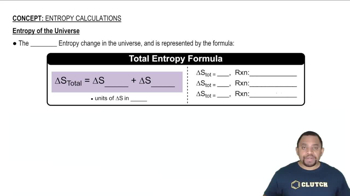Entropy Calculations definitions Flashcards
 Back
BackEntropy Calculations definitions
1/15
Terms in this set (15)
- EntropyA measure of disorder or randomness, typically in units of joules per Kelvin.
- Second Law of ThermodynamicsStates that the entropy of the universe tends to increase, indicating spontaneous processes.
- Spontaneous ProcessA process with a positive total entropy change in the universe, aligning with natural tendencies.
- Non-Spontaneous ProcessA process with a negative total entropy change in the universe, opposing natural tendencies.
- EquilibriumA state where the total entropy change in the universe is zero, indicating no net change.
- Standard Molar EntropyThe entropy of a substance in its standard state, always greater than zero.
- ΔSuniverseThe sum of the entropy change of the system and surroundings, indicating spontaneity.
- ΔSsystemThe entropy change of the system, often calculated using standard molar entropies.
- ΔSsurroundingsCalculated as the negative change in enthalpy of the reaction divided by temperature.
- ΔHreactionThe change in enthalpy of a reaction, typically in kilojoules, used in entropy calculations.
- Standard ConditionsConditions of 25 degrees Celsius and 1 atmosphere pressure for measuring standard entropies.
- Joules per KelvinThe unit of measurement for entropy, indicating energy per temperature increment.
- SigmaRepresents the summation of terms, used in calculating standard entropy changes.
- MolesA unit representing the amount of substance, used in calculating entropy changes.
- Products minus ReactantsThe method for calculating the standard entropy change of a reaction.



